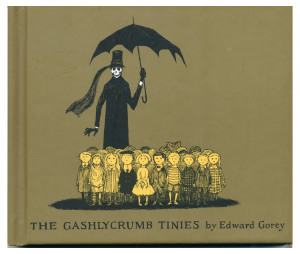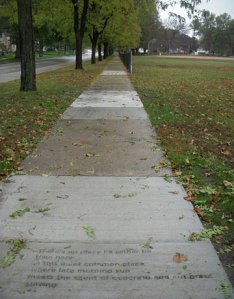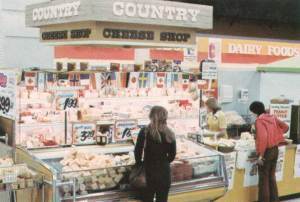Kelly Barnhill's Blog, page 17
April 18, 2012
“No one is afraid of me at all,” she said. And she grinned a wicked grin.
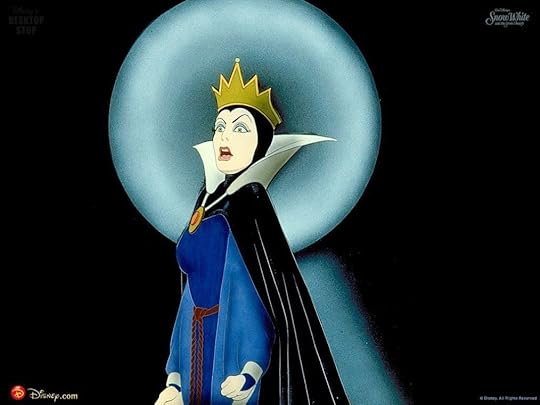 You are not afraid of me, are you?
You are not afraid of me, are you?
Perhaps you should be. After all, I killed a man yesterday. Granted, he was imaginary, but I showed motive, opportunity and intent, so perhaps I should be in prison.
Particularly since it was not my first offense.
So far this year, I have – willingly and without remorse – killed seven people. Recently, when assembling my short fiction and laying out the spine of a possible collection, I took stock of the crimes that I have committed since first writing fiction on a professional level. In my short fiction, there are twenty-two murders, one suicide, countless maimings, one self-inflicted limb loss, and a death by burning. (Side note – never smoke cigarettes while sitting on a pile of dead, dry leaves. Trust me. It does not end well.)
And, of course, this doesn’t count the victims of war in my high fantasy stories. My god. People are dropping like flies.
Now, granted, it could have been a lot worse. One of the early draft of one story had an entire universe of people being snuffed out without a trace. That, apparently, was too scary for middle grade, (who knew?) so I changed it.
The thing is, in real life, I don’t typically strike people as a particularly dangerous person. I am a thirty-eight year old mother of three. I drive a minivan. I volunteer at school. I bake pie and garden and chat with neighbors. I appear sinister or dangerous or threatening to exactly no one.
Once, last year, I was running along Nine Mile Creek in Bloomington. If you’ve never gone running there, I highly recommend it – soft trails along a rushing creek cut in a deep, steep ravine, full of trees and vines and flowers. There is no road noise, no houses in sight, very few people. You run in a river of green. Anyway, last year, I was running along that path, all alone. I was two miles in, and I hadn’t seen a soul the whole time. It was around eleven a.m. on a Wednesday. The bedroom community surrounding the park had all packed up and gone to work. No one was in the park.
Except me.
And some man.
I slowed down. He was about a quarter mile in front of me, travelling in the opposite direction. He looked like he was in his late forties, caucasian, scruffy beard, vest and shirt sleeves ripped off. I could see, even from that distance that he was strong. I looked at him, he looked at me, and neither of us altered our direction.
And I thought should I be frightened? I wasn’t, but I wondered if I should be. I was alone. And attacks happen.
And I thought, if something happened to me down here, would anyone hear me call for help? Absolutely not. That much I knew for sure.
And I thought, does he think of me as a threat. Is he frightened of me? Again, absolutely not. Though, he should have been. I know how to kill a man with a set of keys. I know how to use someone else’s momentum to throw them to the ground and then step on their neck. I know a lot of things. I’ve been in three fist fights in my life, and broke two noses (neither of them my own) in the process. I would likely be able to defend myself if need be. Plus, I was faster and stronger. And I have a wicked left hook.
And I though, how strange that, because of my gender and my age, because of my Anglo features and my crows feet and my wedding ring, no one sees me as a threat.
Now, of course, the encounter in the park occurred without incident. We passed, I said hello, he nodded, and that was that. He was nothing to be frightened of. Neither, apparently, was I.
But you know, I wish I was. Sometimes, I wish I was frightening. Sometimes I wish I was dangerous. Sometimes I wish I was sinister or ominous or wicked or menacing. I am not. I am the open-armed mama folding laundry and cooking soup. No one is afraid of me at all.
Real people aren’t, anyway. Characters, on the other hand, are friggin’ terrified.
And really, in my real life, I like being a cookie-baking matron with a swarm of kids in the back yard and a gentle lilt in the voice. I like being the neighbor with the cocoa on the stove and the wine in the pantry and the nine million sleds or bikes or scooters in the garage. I like drawing pictures with kids. I really do. But I also like the idea that I could be dangerous- that I could be a threat, but that I choose not to.
Because the line between good and evil is perilously thin.
And I want to keep the world on its toes.
Filed under: Uncategorized Tagged: Childrens literature, dangerous moms, parenting, writing novels








April 12, 2012
Today. In the car.
The kids were all buckled in when I ran out to the car, tea sloshing everywhere, shoes only half on. I sat down in the midst of an argument that went something like this.
Cordelia: Mom.
Me: (searching for keys) What?
Cordelia: Tell Leo what boogers are made of.
Leo: Candy.
Me: Not candy.
The Little Redhaired Boy: See?
Leo: Rats.
Me: Boogers are made of dried up snot, skin cells, dust, pollen, street dirt, in your case: dog hair, and lots and lots of germs.
Leo: Well, that's not so bad.
Cordelia: Mom!
Me: What?
Cordelia: Tell him that you can't eat boogers.
Me: Oh. For sure, Leo. You can't eat boogers.
The Little Redhaired Boy: SEE, LEO?
Leo: But boogers are so good! And sometimes I get hungry.
The Little Redhaired Boy: If you get hungry, then you can eat bugs. Lots of people all over the world eat bugs all the time.
Leo: Really?
The Little Rehaired Boy: Yes. So next time you get really hungry, just find a spider. Then eat it.
Cordelia: Or a worm.
Leo: Can I eat grasshoppers?
Me: Sure, but you should first ask its permission. Grasshoppers are terribly fastidious and won't be eaten by just anybody. They will want to know whether you have brushed your teeth lately, and will likely inquire as to the state of your nails. They will want to know if your room is clean and if your toes are free of jam and if you have recently washed the dishes.
The Little Redhaired Boy: My room is clean. I can totally eat a grasshopper.
Leo: I'm fastidious.
(pause)
(pause)
Leo: What does fastidious mean?
Cordelia: It means "not Leo".
Me: You should be careful of grasshoppers, though. While they are reputed to be delicious, they are also terribly clever. A grasshopper might convince you to build it a new house, or give it the PIN to your bank account, or buy it a rocket ship.
Leo: Grasshoppers like pins?
The Little Redhaired Boy: They use them as swords.
Leo: ON GUARD!
Filed under: Uncategorized Tagged: carpool, nova classical academy, parenting








March 21, 2012
Even Apocalyptic Springs Are Precious To Us
It is March, and it is spring. Though it should not be. It is green when it should be white. It is wet when it should be ice. The world is awake and juicy and randy and alive, when it should be cold and chaste and dreaming.
This spring is all wrong. But oh! the green! And oh! the tender shoots! And oh! the swelling buds! And oh! Oh! Oh!
Spring does things to Minnesotans – secret things. We do not speak them out loud, but communicate them instead with impish eyes and tight lipped smiles and dark, deep silences. Spring has come early. And so it is early that we reveal our wintered skin. It is early that we run our fingers over seed catalogs and inhale the damp scent of peat moss and mushroom compost and lime. It is early that we sink our fingers into the cool dirt, rubbing the clay with our palms.
It is too, too early. And we are worried.
It is a strange feeling to be worried about spring and still be moved by spring. We are a cold-climate people. We understand the value of winter. We know what winter does. We know how to keep our families going with last year's potatoes and squash and onions from the root cellar. We know how to make anything into a stew. We know the value of dried herbs and casked beer and braided strands of garlic stalks hung from the rafters. We know how to cheer ourselves with dried fish and hard cheese and honey straight from the pot. When spring comes early, our work is for naught. And when spring comes early, we worry about a killing heat and a merciless drought and next year's harvest.
We who live at the mercy of the weather are professional worriers.
Still, worried or not, there is something precious about spring.
The trees in my back yard are lousy with birds. A fat, bright cardinal is, even now, giving me the stink-eye. His beak is full of sticks and grass. He would like to build his nest on the ledge outside my desk window but he can't – or won't. I am, apparently cramping his style. How, really, can he put the moves on his ladyfriend when I'm sitting there, typing away like some kind of bird pervert. I'm an ornithological voyeur.
Earlier today, I went running along Minnehaha Creek and around Lake Nokomis and the swampy lagoon on the other side of the bridge. (in shorts!) (without a jacket!) (a miracle!) I love that lagoon. The trail is lumpy and uneven and the mud is rank with life and animals abound. Today, it was almost like a children's book. On my run I saw
One white egret, tiptoeing through the mud and
Two red winged black birds, bits of their house hanging from their mouths and
Three baby foxes, blinking their eyes and
Four loud mallards, fighting over a female and
Five small children, wrestling in the mud.
My window is open (in March!) and I am, even now, serenaded by birdsong. I will pray that next year we will be back to normal. I will pray for abundant rains and rational heat indexes and a summer free of crazy storms that destroy neighborhoods or forests or farms. I will pray that this strange spring is not a harbinger of certain doom. I will forget everything I know about global climate change and the irrevocable harm that my people have done to the planet.
And instead, I will treasure the spring. I will offer a toast to the courting birds who are, even now, opening their throats with songs of passion and sex and ardent love. I will raise my glass to them and sing their praises.
Because even if this is the early notes of the apocalypse, I'm glad the birds are getting lucky. Hell, maybe we all should do the same.
Filed under: Uncategorized








March 14, 2012
Right Writer, Wrong Book
Once, a long time ago, I wrote a book. A mystery novel called Little Girl Blue. I wrote that thing, and re-wrote it, and sliced it and diced it and took it apart and put it back together again. After much labor and effort and care, I wrote up a query letter and sent that baby into the world.
You will never read this book. Not ever. It's not a bad book, not at all. I just read through it, and I'm still pretty proud of it. But it's the wrong book. I'll get to that in a minute.
Now, Little Girl Blue was not the first book that I started. There were other, sophomoric efforts that collapsed under their own weight, or shifted focus so wildly that they had the frenetic feel of seventeen novels crashing into one. These you will similarly never see. These I am not proud of.
But LGB was different. It was the first book that I had written that was utterly and completely separate from me. It had legs and eyes and skin and hair. It had breath and hunger and thirst. It moved. And of course that's interesting because it was the first time that I had drawn deeply from my own experience to create a fictional world. Prior to that, my main characters had been fifty year old women or aged ex-priests or drug dealers or Harley riders. My main characters were entirely not me. Indeed, fiction was my way of being not-me, of taking a break from my neurotic, complicated self.
And, of course, I wrote a lot of crappy fiction. More stuff that you will not see.
In LGB, I wrote about a woman around my age, an ambivalent mother, wife, and teacher. And that ambivalence was crushing her. In writing this book I was trying to unpack an experience I had working at a school in Oregon that had, two years before I arrived, had Aryan Youth protests that got ugly. At this school, there were kids who were on lists, and I was told to memorize them. Kids who were known AY. Kids who were white supremicist sympathizers. Kids who were there when they should not have been. There were key words that I was to listen for and phrases that I was to report and behaviors that should be written up instantly.
At the time, I was twenty five, pregnant for the first time, married mid-way, and just barely getting by. I was in a time of transition, of saying goodbye to the life I thought I was living, and trying to embrace the life that I now had. It took many years to be able to make sense of what happened that year – of what happened to me.
I changed. And it wasn't comfortable. The transition from single person to married person. Wonderful, sure, but uncomfortable. The transition from non-mother to mother. Uncomfortable. The realization that people can think and do terrible things - and that you'll love them anyway. Uncomfortable. And the careful maneuvers in a closed society made crazy in its response to crazy things. Very, very, very uncomfortable.
So I explored this discomfort in the context and form of a mystery novel. I poured who I was then into the character of Abby Blue, and she, in turn, became entirely separate from me. And her story became her own story. And her book became real, true and alive.
I still really like it.
So I sent it out.
I wrote query letters and scattered them across the four winds.
I queried wildly, inappropriately, and with gusto, abandon and verve.
And I got a lot of rejections. And then I got a lot of requests to read the book. These were universally followed by another rejection. I got kind rejections and brusque rejections and impersonal rejections and form rejections that mask themselves as personalized but secretly are not. I read through my rejection notes like a medium reads tea leaves.
I was addicted to my email. Obsessed. I would wake up three or four times a night to check if anything came. I was impossible to live with.
Finally, an agent (I won't give out her name, and honestly she likely doesn't even remember her kindness to me. The best kind of kindness is that which is unaware of itself. The best kind of kindness spontaneously generates. This was the best kind of kindness) wrote me back. She was a known entity, both a mover and a shaker, and well regarded to be very good at what she does. She represented something called "up-market women's fiction" which I still can't entirely define (or even slightly define) but it seemed to me that Little Girl Blue qualified. I queried her. She wrote back and asked for the full manuscript. Two weeks later she wrote me back.
"I've read your manuscript three times," she wrote, "and I really like it. But…."
(There's always a "but", I thought.)
"There's a thought that keeps creeping in, and I can't shake it. The more I read this book – and you really did a good job. The prose is tough and resilient, the characters intricately drawn, the pacing is heart-pounding. But with each page I find myself thinking, "Right writer; wrong book." If this was your third or fourth book, I'd likely be able to find a home for it. But it's not the book for you to come out of the gate with. Also, I feel that this isn't the book you were meant to write. Write me the right book. Then send it to me."
I was telling somebody this story recently, and she said, "Oh, that must have been so hard to hear!" But the thing is, it wasn't. I had been querying and requerying LGB for months. I had stopped writing. I had stopped reading. I stared at my computer, all dead-eyes and zombie skin. It was draining my soul away. The moment I read that, I felt a terrible weight lift from my body.
That letter set me free.
The next day I started The Mostly True Story of Jack. And that was the right book.
My mother asks me from time to time if I'll ever try again to get LGB published. Probably not, I tell her every time she asks. Because why waste time on the wrong book when the right one is spinning itself, even now on the scribbled notes on my desk, in the stories I tell my kids in the dark, in the quiet glow of my computer, in my wide, wild mind. I've learned how to find the right book – for this writer at this moment.
And for you, dear readers, I hope for the same. I hope that you also encounter a kind person who will tell you if you've deviated from the path that you need to be on. The path that you are. I hope that all of you, perhaps today, will be writing the right book.
And I hope that I will get to read it.
Filed under: Uncategorized Tagged: novels, query letters, The Mostly True Story of Jack, writing fiction








February 24, 2012
20th Annual Hubbs Children’s Literature Conference
 Are you interested in Children’s Literature? Well, that’s fascinating because so am I! Every year, teachers, librarians, parents, writers, and all sorts of folks who feel passionately about children’s books, literacy, and the glorious journey through Story undertaken every day by children everywhere, all gather at St. Thomas University for the annual Hubbs Children’s Literature Conference.
Are you interested in Children’s Literature? Well, that’s fascinating because so am I! Every year, teachers, librarians, parents, writers, and all sorts of folks who feel passionately about children’s books, literacy, and the glorious journey through Story undertaken every day by children everywhere, all gather at St. Thomas University for the annual Hubbs Children’s Literature Conference.
And it’s tomorrow! And you should come!
On the schedule this year?
Well Christopher Paul Curtis, for one. 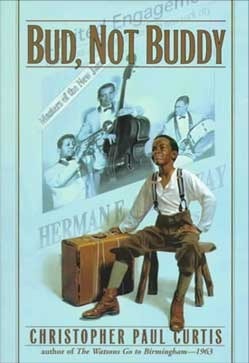 (And oh! The palpitations of my heart! And oh! The quivering of my limbs! I love that guy, I really do.)
(And oh! The palpitations of my heart! And oh! The quivering of my limbs! I love that guy, I really do.)
And Linda Sue Park, for another. 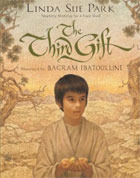
I’ll be there, signing books at ten, and then doing a talk on use and role of magic in the Middle Grade Novel. I shall be telling a story that may or may not make people cry. You have been warned.
In any case, if you’re free tomorrow from nine until three, you should come by. It’ll be fun!
Filed under: Uncategorized








20th Annual Hubbs Children's Literature Conference
 Are you interested in Children's Literature? Well, that's fascinating because so am I! Every year, teachers, librarians, parents, writers, and all sorts of folks who feel passionately about children's books, literacy, and the glorious journey through Story undertaken every day by children everywhere, all gather at St. Thomas University for the annual Hubbs Children's Literature Conference.
Are you interested in Children's Literature? Well, that's fascinating because so am I! Every year, teachers, librarians, parents, writers, and all sorts of folks who feel passionately about children's books, literacy, and the glorious journey through Story undertaken every day by children everywhere, all gather at St. Thomas University for the annual Hubbs Children's Literature Conference.
And it's tomorrow! And you should come!
On the schedule this year?
Well Christopher Paul Curtis, for one.  (And oh! The palpitations of my heart! And oh! The quivering of my limbs! I love that guy, I really do.)
(And oh! The palpitations of my heart! And oh! The quivering of my limbs! I love that guy, I really do.)
And Linda Sue Park, for another. 
I'll be there, signing books at ten, and then doing a talk on use and role of magic in the Middle Grade Novel. I shall be telling a story that may or may not make people cry. You have been warned.
In any case, if you're free tomorrow from nine until three, you should come by. It'll be fun!
Filed under: Uncategorized








February 22, 2012
The Gluecaps: A Sinister Tale of Depravity and Woe.
My daughter and her good friend have penned a poem called The Gluecaps. It is a devilish little urchin of a rhyme – all patchworked aprons and ratty fingernails and whispered fright.
And I'm going to share it with you now because it makes me think of an article that ran in the Wall Street Journal a while back, in which a very silly woman wrote an…impolitic rant about how children's books are "too dark".
"Too dark?" people asked. "Really?" The twitterverse and blogosphere summarily exploded, and many people said some smart things and many more people said some misguided things and various wagons were circled and various lines were drawn in the sand.
But no one really talked about kids. Nobody talked about the darkness that they explore every dang day in their imaginative play.
Here's the thing: my house, on any given day, is overrun with friggin' children. And I love them all desperately. There are twelve year old children and nine year old children and hordes and hordes of seven year old boys. And I listen to them all the time. I pay attention to the language of their play and the language of their imagination, and you know what? These kids are darker and creepier and far more sinister than anything that you will find on display of a Barnes & Noble or on any possibly-pinko-commie librarian's do-gooder shelves. In their imaginations, villains lurk under the stairs, assassins hide behind shower curtains, and tentacled monsters slurp along the basement floor. For these kids, war is a way of life (indeed, it's what one does between breakfast and lunch, and again in the hours before dinner – preferably in the kitchen while your parents are trying to cook), posses must be constantly assembled, evil stepmothers and overlords are ever threatening both life and limb, and someone is dying of an incurable disease.
Also, we can all, apparently, talk to animals.
The point is, in the bruhaha that followed the ridiculous comments that Ms. Gurdon laid forth in that article so long ago missed an essential point – people who write for children, even those of us whose work veers into the dark and the creepy and the vaguely sinister – we are only scratching the surface of what is going on inside these kids' heads. It is not that we are too dark or our books are too dark or that we're destroying childhood or that we have some kind of sinister intent with our books. It's that kids are dark. They're really dark. The imaginative life of a child is boundless; it breaks rules; it is not safe.
The more I listen to kids, the more I know that they are far more brave than we can ever hope to be, and the stories they dream up would keep me in nightmares for weeks.
Which is why I'm glad that the kids don't mind my listening. Because they are marvelous resources. And by "resource" I mean "people I steal from."
Anyway, here's the poem that my daughter and her friend wrote last week. I hope you enjoy!
The Gluecaps: A Sinister Tale of Depravity and Woe
This is Mr. Gluecap
He sits with you at night
And when the dancing bears come
You choke and scream with fright.
This is Mrs. Gluecap
She's Mr. Gluecap's wife.
She disappears behind your back
And stabs you with a knife.
This is Baby Gluecap;
She's her mommy's helper.
She knocks you out and puts you in
A field without a shelter.
This is Grandpa Gluecap
He grew to be so old.
He disappears into your mouth
And fills it full of mold.
I have to admit: I like the last one best.
Filed under: Uncategorized Tagged: children's books, Imaginative children, Meghan Cox Gurdon, Middle Grade Novels, Wall Street Journal








February 18, 2012
In Balance With This Life (Some thoughts about Mary Oliver)
I once saw a hawk standing imperiously in the middle of the sidewalk, eating a mouse. The mouse was still alive, tucked under one claw, its skull pierced and bleeding, the bird dipping in for more and more. With each dip, the mouse's body shuddered and bucked. Its small mouth gaped, then closed, then gaped again. I could hear its wheeze.
It was alive.
Or, perhaps it was not alive, and it was simply the remaining pulses of a defunct electrical system. A last-ditch short after the power's been cut.
The hawk took another mouthful. The mouse shuddered. I stood on the sidewalk holding my daughter's hand – she was five, then, and we were on our way to the bus that would haul her to Kindergarten and haul her home again. She narrowed her eyes at the hawk – it was a beautiful thing. Brown and red and shining. It focused its bright, yellow eye on her with an expression that said, indisputably, Find your own dang mouse, Bub.
"When something eats something that is alive," Ella said, "do they eat alive? Can you eat alive?"
"I'm not sure I understand," I said.
"Can you eat dead?"
"Most of what we eat is dead," I said. I tried to pull her along toward the bus stop. I didn't hear the far-off jangle of the wheels, so we had a bit of time. Also, to be frank, the way she stared was starting to creep me out. "I suppose," I said, "when we eat things from the garden, they stay alive for a while. The cells still respirate. They still make sugar. They still divide. The lettuce we pick is dying, but when we eat it, it's still alive."
"That mouse is dying," she said.
"I think it's dead."
The hawk, as though listening, turned its eye to the mouse. It hadn't gutted the poor thing yet, and suddenly seemed in no mood to do so. It shook its head, adjusted its shining wings and flapped suddenly, gracelessly away. The mouse remained on the ground. It was quite dead. We walked toward the bus stop. I could hear the far-off diesel engine. It was coming.
"When we breathe in," Ella said, "we're alive. When we breathe out, we're dead. Our hearts are alive, but our skin is dead. Our hair is dead too."
"The dirt," I said, "Is made of dead plants and dead bugs and dead animals too. But the dirt is alive. It's filled with billions and billions of tiny organisms that make the food for the plants to grow. The dead cells on your skin protect the living cells underneath. Those dead cells are your protectors."
"That's gross," she said.
"I know," I said. "Sometimes, there's really no difference between alive and dead. They're just two different sections of the same long road."
She gave me a sidelong, skeptical glance. "You never make any sense," she said.
We stood at the bus stop. She crouched down and hugged her knees. "If part of me is already dead, does that mean that I'm in heaven right now. Is being in heaven the same as being with my mom?"
"I have no idea," I said. "But if I had to decide what heaven was like, I'd make it right this second. Right now on this corner. This moment with you."
"You're weird," she said. "But I love you anyway."
"I love me anyway too," I said. "Also, I love you. Very, very much."
The bus arrived. She had been, for the six weeks prior to that day, WAY TOO OLD to give me a kiss goodbye. But she turned and kissed me anyway. Briefly, and without ceremony. Then she slid inside the yawning bus. It shuddered, burped, and took her away.
I have found myself thinking of this story because of Mary Oliver.
I'm sure all of you have read Mary Oliver and have, as I have, significant moments in your lives in which her poems have played a major role. I know for me, there were some dark times in college, and later under the weight of post-partum weariness, and even later during the most terrifying depression of my life in 2008, in which Oliver's poetry was a warm, earthy, living hand, curled tightly into my own, and leading through the rough terrain. And all the while saying, "Look, the grasshoppers!" And "Look, the early blossoms like crisp sheets drying on the line." And "Look, the geese! The geese!"
Almost thirteen years ago, I got married to the most wonderful person in the world, but we got married under a cloud: my sister had been in the hospital for a month, and had returned a mere shadow of herself. My father had suffered a major stroke. My father's two best friends had nearly lost their lives to sudden, and random illnesses. The wedding itself was a hastily done affair, planned because of an unplanned pregnancy, and put on hold when the pregnancy almost ended in a rush of blood and sorrow – not once but six different times. It's a miracle that Ella survived. A true and real miracle.
And so it was in that cloudy place that, during the ceremony, my beloved Sister In Law stood and read "The Wild Geese", by Mary Oliver.
Wild Geese
You do not have to be good.
You do not have to walk on your knees
For a hundred miles through the desert, repenting.
You only have to let the soft animal of your body
love what it loves.
Tell me about despair, yours, and I will tell you mine.
Meanwhile the world goes on.
Meanwhile the sun and the clear pebbles of the rain
are moving across the landscapes,
over the prairies and the deep trees,
the mountains and the rivers.
Meanwhile the wild geese, high in the clean blue air,
are heading home again.
Whoever you are, no matter how lonely,
the world offers itself to your imagination,
calls to you like the wild geese, harsh and exciting –
over and over announcing your place
in the family of things.
~Mary Oliver~
It's a funny thing about poetry. We do not expect it to change us. We do not expect it to be alive. And yet there it is, again and again, a thing both alive and dead. The dead protecting life; life giving life to death; a single moment of beauty announcing our place in the family of things.
I just learned today that Mary Oliver is seriously ill. Some of her friends have launched a tribute blog, in which people can submit and post moments in their lives in which Oliver's poetry has touched them, changed them, made them whole again. I encourage you to read these, and submit your own. I encourage you to buy another book of her poetry. I encourage you to live the life that her poems tell us we can live: utterly gorgeous, utterly precious, utterly wild.
Filed under: Uncategorized Tagged: Mary Oliver, nature poetry, raising kids, raptors








February 10, 2012
I’m giving a reading! At Barnes & Noble. And you should TOTALLY COME!
It has been years – years! - since I last visited the Har Mar Mall, in all it’s glittery, cheese-tastic glory. In fact, it’s been so many years, that my memory of the mall is significantly more awesome than the mall likely is anymore.
I’m sure the chandeliers are gone, for example. And the glittery signs. For sure, I know that the theater is gone.
\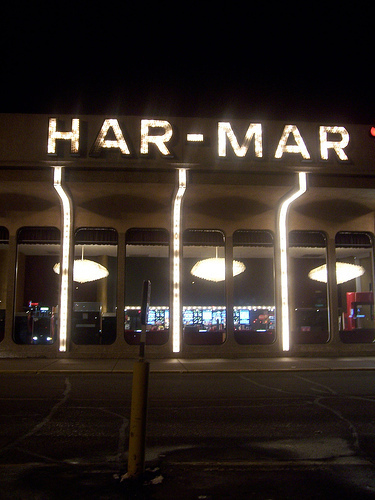
And that’s a true and real shame. Because oh! Those lights! And oh! those ginormous pendants! What a loss. What a sincere loss.
But I digress.
I’m here to tell you that I’m going back! To Har Mar! For the first time since the early nineties!
On February 18 at 2:00 I shall become a Har Mar Superstar.
And no, I don’t mean the guy who sings in his underwear.
(I am pretty sure that I, for example, will not be singing in my underwear. Mostly sure, anyway. I have, of course, promised that very thing before, and reneged on that promise. Ask my kids. The phrase, “Mom is singing in her underwear. Again.” is, alas, common in my house.)
No, it shall be myself in clothes. Regular clothes. And my book! And reading my book and signing my book and doing tricks with my book and talking to kids and grownups about whatever it is they want to talk about – books, stories, whether or not I wrote all the words. All by myself. And whatever.
And it will be fun! And you should come. Bring your friends, bring your mortal enemies, bring people that you don’t really care about either way. And we’ll have a good time.
I may have to pay a visit to the gravesite of that old movie theater. I did, after all, go on the absolute worst blind date of my entire young life with a young man with a mustache that looked like a caterpillar had died on his upper lip. A young man who was, if it was possible, cheesier than the mall itself.
How cheesy you ask?
Here’s a link to the store page with more information on the reading. Seriously, you should TOTALLY COME! I might even sing.
Filed under: Uncategorized








I'm giving a reading! At Barnes & Noble. And you should TOTALLY COME!
It has been years – years! - since I last visited the Har Mar Mall, in all it's glittery, cheese-tastic glory. In fact, it's been so many years, that my memory of the mall is significantly more awesome than the mall likely is anymore.
I'm sure the chandeliers are gone, for example. And the glittery signs. For sure, I know that the theater is gone.
\
And that's a true and real shame. Because oh! Those lights! And oh! those ginormous pendants! What a loss. What a sincere loss.
But I digress.
I'm here to tell you that I'm going back! To Har Mar! For the first time since the early nineties!
On February 18 at 2:00 I shall become a Har Mar Superstar.
And no, I don't mean the guy who sings in his underwear.
(I am pretty sure that I, for example, will not be singing in my underwear. Mostly sure, anyway. I have, of course, promised that very thing before, and reneged on that promise. Ask my kids. The phrase, "Mom is singing in her underwear. Again." is, alas, common in my house.)
No, it shall be myself in clothes. Regular clothes. And my book! And reading my book and signing my book and doing tricks with my book and talking to kids and grownups about whatever it is they want to talk about – books, stories, whether or not I wrote all the words. All by myself. And whatever.
And it will be fun! And you should come. Bring your friends, bring your mortal enemies, bring people that you don't really care about either way. And we'll have a good time.
I may have to pay a visit to the gravesite of that old movie theater. I did, after all, go on the absolute worst blind date of my entire young life with a young man with a mustache that looked like a caterpillar had died on his upper lip. A young man who was, if it was possible, cheesier than the mall itself.
How cheesy you ask?
Here's a link to the store page with more information on the reading. Seriously, you should TOTALLY COME! I might even sing.
Filed under: Uncategorized









